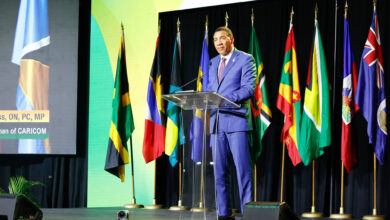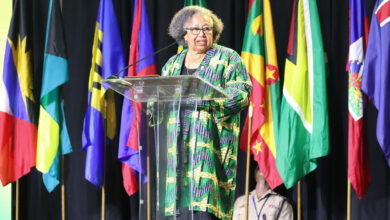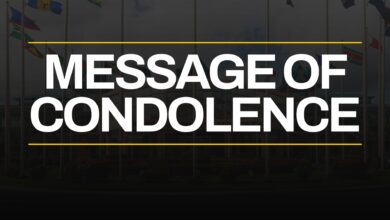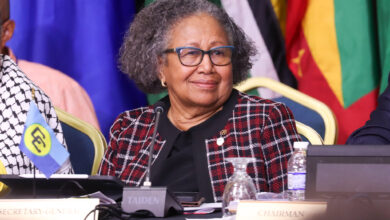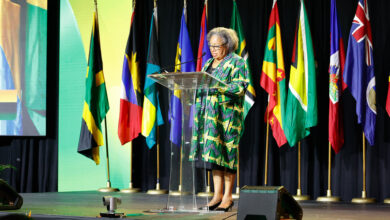Mr. Raymond Ryan, Chairman of the Caribbean Fisheries Forum
Mr. Juichiro Sasaki, Leader of the Government of Japan/ Japan International Cooperation Agency Study Team
Other members of the Japanese delegation
Mr. Hugh Saul, Executive Director, Caribbean Regional Fisheries Mechanism
Directors of Fisheries and Chief Fisheries Officers of CARICOM
Other Members of the CARICOM team
Staff of the CARICOM Secretariat
Ladies and Gentlemen
I welcome you all with great pleasure to the CARICOM Secretariat. In doing so I extend a very special welcome to the members of the team from Japan who are visiting our Region to assist us in advancing fisheries and aquaculture development and management – an initiative which will have far reaching positive implications for the sustainable livelihood of the people of the Caribbean Community.
This meeting is taking place in the year of the CARICOM Single Market and in the context of the New Framework for CARICOM-Japan Cooperation for the Twenty-First Century – which was approved by CARICOM Ministers of Foreign/External Affairs and the Minister of Foreign Affairs of Japan in Tokyo in November 2000 on the occasion of the first CARICOM-Japan Ministerial Meeting. In August last year in this very room, there was a very productive exchange of views at the Tenth CARICOM-Japan consultations, which reviewed priority areas for future cooperation, including fisheries development.
We are indeed grateful to the Government of Japan for its continuing assistance under the New Framework Agreement. I am particularly pleased to participate in the opening of this meeting to carry forward the formulation of a Master Plan for Fisheries and Aquaculture Development and Management in the Caribbean.
I also wish to take this opportunity to reiterate my thanks and appreciation to the Japanese government which, within the context of its broader international cooperation programme, has provided significant assistance to the Government of Guyana for the construction of our very own CARICOM Secretariat headquarters building – inaugurated on 19 February 2005. I hope the JICA team will be able to visit the building.
Ladies and Gentlemen, fisheries have always been an important source of livelihood and sustenance for Caribbean people. It has been a major contributor to their nutrition and food security and to foreign exchange earnings and poverty alleviation. It has also been the source of much employment, and has therefore contributed to the development and socio-economic stability of rural and coastal communities. It has even facilitated recreation and enhanced our tourism.
Currently, our per capita consumption of fish in the Region is approximately 15 kg and we envisioned a future in which fisheries will continue to make a sustained contribution to our social and economic development.
We are cognizant that the exploitation of our fisheries resource must be pursued in the context of strategies that will result in the sustainable management and development of the Caribbean Sea – our common patrimony. This prospect and potential is, however, under threat from over-exploitation and/or habitat degradation. For example, it is reported that all the major traditional commercially targeted marine species in the near-shore waters, such as conch, lobsters, and shrimp are either fully developed or over-exploited.
On the other hand, the available data suggest that there are fish species and other marine organisms that can be developed and utilized for human consumption or for other commercial purposes. Currently, these are however, not making optimum economic contribution because they are either unexploited or under exploited.
Today, therefore, Caribbean countries face two main challenges in the sustainable development and management of their fisheries resources. The first is to acquire data and information to better understand the complex and inter-related processes that determine the abundance and distribution of the marine resources and the economic, sociological and technological factors related to their exploitation and conservation.
The second challenge is to identify ways to develop, to use and to protect fisheries and aquatic resources in a manner that provides optimal benefits to society, while ensuring their continuation as functional, self-sustaining elements of the ecosystem.
As regards this issue of the sustainable development and conservation of the fisheries resources of the Region, this is constrained by a number of factors, including:
Inadequate human and institutional capacity for research, development and management;
Insufficient knowledge of the resource systems and needs of those who are dependent on the resources for their livelihood;
Lack of appropriate harvesting, production and processing technology;
Inadequate seafood safety and quality assurance systems;
Limited range of products and inadequate marketing and trade arrangements for fish and fishery products; and of course
Lack of financial resources.
Countries in the Region must acquire the human and institutional capacity, the technology and the necessary knowledge if they are to succeed in developing and using their fisheries resources in a sustainable manner.
The Japanese are widely regarded, and justifiably so, as being among the world leaders in the management and utilization of fisheries and other aquatic resources. We in CARICOM therefore, see clear benefits from capitalizing on this wealth of knowledge, information and experience that Japan makes available through the various technical cooperation agreements. It is against that background, Ladies and Gentlemen, that we are confident that the master plan you are elaborating will benefit tremendously from the participation of Japanese technical experts and the consequent injection of financial and other resources. Japan and CARICOM share a mutual desire to develop and use aquatic resources in a sustainable manner to support economic growth and human development.
This field of activity is not new to the CARICOM Secretariat either, for between 1991 and 2001, the CARICOM Secretariat, with considerable assistance from Canada and CARICOM Member States, coordinated the implementation of the CARICOM Fisheries Resource Assessment and Management Programme, managing financial and technical resources and creating the environment for a regional fisheries management body – the Caribbean Regional Fisheries Mechanism (CRFM) which was established in March 2003.
The mandate of the CRFM, with headquarters in Belize, and an Eastern Caribbean Office in St. Vincent and the Grenadines, is to promote and facilitate the responsible utilization of the Region's fisheries and other aquatic resources for the economic and social benefits of the current and future population of the region.
With the decline of major traditional industries such as sugar and bananas, among others, this mandate has taken on greater urgency as we pursue a diversified path to our sustainable development through the establishment of our CARICOM Single Market and Economy.
I look forward to meaningful discussions between the Japanese Team and Caribbean fisheries experts towards the elaboration of the Master Plan for Fisheries and Aquaculture Development and Management in the Caribbean and a timetable geared for early approval and implementation, led by the CRFM.
In closing, Ladies and Gentlemen, in the spirit of warm and friendly cooperation which CARICOM and Japan enjoy, I would like to present to the leader of the Japanese delegation, a copy of our most recently published book, “CARICOM, Our Caribbean Community: An Introduction”. We hope that you will find it, Sir, informative and inspiring and the source for the further strengthening of our cooperation.

